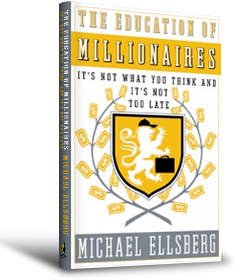Education of Millionaires Review (and Important Takeaways)
I read a great book recently.
There’s a lot of great information in there – information that can make you more successful in business.
I can’t wait to share what I learned with you.
It’s called The Education of Millionaires: It’s Not What You Think and It’s Not Too Late. Michael Ellsberg is the author. He’s the son of Pentagon Papers whistleblower Daniel Ellsberg and a regular contributor to Forbes magazine. (If you sign up for his email list, you can download a free preview of the book.)
This book chronicles his transformation from an unemployed, depressed writer who lived with his parents to a successful entrepreneur.
Michael had all the credentials. An Ivy-league diploma and a prep school pedigree. Everything conventional wisdom tells us we need to enjoy material success in the “real world.”
Naturally, he began to wonder why he wasn’t financially successful. How were other people with unconventional backgrounds – those who eschewed academia and institutionalized education – “making it big” when he was’t?
Even at this low point, Michael was sharp enough to recognize that success leaves clues. So he embarked on a whirlwind tour to interview some of the most financially successful people in the U.S.
He talked to people from various backgrounds. He mined their brains in a relentless attempt to get to the bottom of the question that had eluded him since he graduated from Brown University:
What does it really take to be successful?
This book is Michael’s answer to that question.
The wisdom inside can’t be found in textbooks or lecture halls, but only in the minds of people who actually became successful. It’s full of real-life, practical stuff learned out of necessity and implemented by trial and error. And that’s why it’s so valuable.
Michael did the digging for us, and he distilled what he found into 7 essential “Success Skills.” Fortunately, all of them can be learned. Successful people are not a secret alien race, though their mindsets and how they spend their time sets them worlds apart from the average worker.
Each of the 7 success skills is listed below, along with bullet-points to emphasize what I found to be the most valuable information from within the respective sections:
1. “How to Make Work Meaningful and Your Meaning Work”

Starving artist or corporate sell-out? Do you have to choose?
Either we follow our passions and purpose, and incur a significant risk of ending up as a starving artist, or we follow a safe, predictable, boring path, and incur a significant risk of ending up full of regret in our lives . . . Is there a way to combine the relative safety and security that our parents advocate with the passion, meaning . . . and freedom that teenagers and twenty-somethings dream about? Is there a way to get the best of both worlds? Yes. I believe there is. (p. 35)
- Most people feel they have to choose between doing something significant and something more mundane but financially stable.
- Making a living is an art. It’s being able to live in that sweet spot of doing something meaningful enough for your tastes, but commercially viable enough for comfort.
- You don’t have to go “all in” to live a more significant life. This works for some people, but most people who risk it all to become the world’s next great musician, actor, etc. end up frustrated and miserable.
- Corollary: you don’t have to “sell your soul” and surrender your dreams to cubicle life forever.
- Michael recommends 4 steps (followed in order) to find the balance between living a significant life and a financially comfortable one:
- 1. Get on your feet financially. This is the painful part where you cut expenses, pick up an extra job or two, and pay down your debt. It doesn’t need to last forever, but it’s important to build a financial “base” and get used to paying your bills on time!
- 2. Create room to experiment. Now that you have money coming in, it’s easy to get comfortable in that routine. Don’t do it! You need to create an environment that maximizes your time to explore your passions. Michael brings up flex time and telecommuting as two options to consider.
- 3. Experiment! Here’s the fun part: using your spare time proactively to make plans, pick up new skills, and pursue (or figure out) your life’s purpose.
- 4. Strike out on your own (optional). If your current job or industry doesn’t align with your passions, or if you want to be an entrepreneur in your field, you rely on all of the other success skills to launch your own venture.
2. “How to Find Great Mentors and Teachers, Connect with Powerful and Influential People, and Build a World-Class Network”

Your social circle is more powerful than your elbow grease ever will be.
Give give give. Give give give. Give give give. Give generously within your network, and to people you hope will be in your network one day. Always inquire within yourself, and within your deepest creativity, how you can be of greater service. Without keeping track and without concern for a specific quid pro quo. (p. 97)
- Most young professionals try to connect with mentors by offering their time and labor. This isn’t the most efficient way to do things, because who you know and what you know can be thousands times more valuable than going on coffee runs or hanging around the office making copies.
- Trying to connect with influential people with a “what’s in it for me?” perspective is the wrong approach. It’s better to get creative about how you can use your talents to help successful people become even more successful.
- You have more to offer influential people than you think. Is there someone you can introduce them to? Can you give them advice about fitness or relationships? Or maybe teach them one of your hobbies?
- Investing in your human capital is essential, no matter what field you’re in.
3. “What Every Successful Person Needs to Know about Marketing, and How to Teach Yourself”

Good marketing does NOT look like this . . .
In [Dan] Kennedy’s words: “The breakthrough realization for you is that you are in the marketing business. You are not in the dry cleaning or restaurant or widget manufacturing . . . business. You are in the business of marketing dry cleaning services or restaurants or widgets . . . When you embrace this, it makes perfect sense to set your sights on marketing mastery.” (p. 105)
- The key to making money is to cause something to get sold. Marketing plays a huge role in doing this.
- Marketing consists of two parts:
- 1. How well the product or service is designed to meet the needs or solve problems of a specific target niche; and
- 2. How well you get the word out to that niche after you’ve launched your product or service.
- Most marketing learned in traditional business education is “brand” or “image” marketing with no particular goal. It won’t work for you when you’re starting out with a small budget. You need quick, measurable results now.
- Most marketing focuses on what the marketer wants to sell, when it should focus on how the prospect’s life will change if he or she buys.
- If you don’t listen to your niche or care what they say, you’ll never be a good marketer.
4. “What Every Successful Person Needs to Know about Sales, and How to Teach Yourself”

Can you feel the sleaze from your computer screen?
To the extent you haven’t achieved the material results you want in the real world, it’s because you’ve bought into this “I’m Above Learning to Sell” mentality. Expunge it from your system. Now. Every last drop of it. (p. 128)
- No matter what you’re doing in life, you’re selling something, whether it’s your products or services, yourself (to an employer), to the public (if you’re a politician), etc.
- “Selling” turns people off because it has a bad rap of being manipulative . . . but it doesn’t have to be.
- When done well, sales is a simple conversation where you discover whether what you’re offering matches up with the prospect’s needs. It isn’t sleazy.
- People won’t come beating on your door if you invent the proverbial “better mousetrap.” You still have to convince them to choose your offering over your competitors’.
- Good selling means figuring out what the prospect really wants. They don’t “want to lose 20 pounds.” They want to feel attractive for their husband again. They don’t “want to double their income.” They want to provide better for their children.
- If you sell by creating relationships built on trust, the results will fall into place.
- Buy the book SPIN Selling by Neil Rackham. Read it and absorb it. It tells you everything you need to know.
5. “How to Invest for Success (The Art of Bootstrapping)”

Grab onto these. They’ll take you all the way to the top.
Bootstrapping is a concept central to the themes in this book. In the world of business, it’s a strategy that involves getting to the point of profitability as quickly as possible – even if the profits are small – and then continually investing profits to fuel growth. (p. 158)
- The process of getting a formal education – investing 5 or 6 figures and years of your life now for (hopefully) better job prospects in the future – is the “anti-bootstrap.” It’s the exact opposite of what Michael recommends when you’re starting your journey to financial success.
- After you get on solid ground financially (see Success Skill #1), start making incremental investments in your potential to earn more money in the future.
- Bootstrapping investments can take different forms. You could choose to invest in product design and testing, quality coaching programs, seminars, etc.
- Once these you can make these investments out of your cash flow (without disturbing your savings), do so. This makes it so you’re constantly learning and not going into debt.
- Your human capital is your greatest investment. It’s the only thing you can rely on in an uncertain global economy.
6. “Build the Brand of You (or, To Hell with Resumes!)”

You want your “brand” to look like these. Notice how many of them are people’s names!
Even if you work for another company or are building a company totally separate from your own identity, you should separately and simultaneously build up your online brand around you as a person, not around a concept, a company, or a niche. Companies, niches, and keywords come and go. Your own personal brand stays with you for life. (p. 184)
- Your brand is your “reputation that precedes you.” It takes a long time to build a good reputation but only seconds to destroy one . . . so guard yours carefully.
- Whatever your field, there is doubtless an online community built around that field. You should be getting to know these people and learning from them.
- Do things. Make things. Sell things. Lead. And make sure there’s a “Google trail” documenting all the cool stuff you do.
- You’re best off using your own name as your personal brand.
- Don’t be afraid to inject your own personality into your brand. Otherwise it will come off as fake.
7. “The Entrepreneurial Mind-Set Versus the Employee Mind-Set”

Which type of mindset do YOU have?
If you take on the entrepreneurial mind-set, you see yourself as responsible for the impact you have in your business or workplace, and for your own success and advancement in life. You have become the active ingredient in your own life, and in your workplace. You see a problem in your life or in your surroundings and fix it. You don’t count on some higher authority to make things better; you make things better yourself, whether or not you have the authority. (p. 217)
- Cultivating an entrepreneurial mindset will benefit you whether you’re an employee or an entrepreneur. It’s making a decision to impact the environment around you instead of letting it make you to react.
- Bryan Franklin, a well-known executive coach and one of Michael’s personal mentors, notes 6 key distinctions between the “entrepreneurial” and “employee” mindsets:
- 1. Focus on contribution VS. Focus on entitlement
- 2. Focus on outcome VS. Focus on output
- 3. Sort for what’s needed VS. Sort for what’s requested
- 4. Work yourself out a job VS. Work to protect your job
- 5. Moves towards big decisions VS. Avoids even minor decisions
- 6. Sees circumstances as temporary VS. Sees circumstances as permanent
- If you think you fit the bill for the entrepreneurial mindset, don’t rest on your laurels! Think about how to grow and contribute even more.
- Adopting the entrepreneurial mindset gives you the best chance to improve your situation and enjoy financial success.
- Working hard, but hanging on to the employee mindset, is a recipe for a lifetime of frustration and wasted potential.
Final Words
Michael’s book gives us a ton to think about. It’s the perfect jumping off point for the long but necessary process of reprogramming your mind and aligning your actions to inevitably lead towards success.
What I appreciated the most was the author’s willingness to be open-minded. So many people right now are in situations like the one he was – broke, in debt, with few career prospects – and accept it. They direct their focus outward at all the injustices of the economy or the job market instead of figuring out what they can do to improve things.
That’s not an empowering place to be, and this book isn’t having any of it. It gives you the tools you need to take charge.
I did my best to be comprehensive. I pulled out the points I found the most useful for my Education of Millionaires review.
Don’t let that stop you from picking up a copy and reading it yourself. The interview excerpts and recommended business resources inside are well worth the price of admission by themselves.
And chances are you’ll find something I didn’t mention that resonantes with you, regardless of where you are right now in your business.
P.S. What’d you think of my Education of Millionaires review? I hope you found it helpful. Leave me a comment and let me know.
